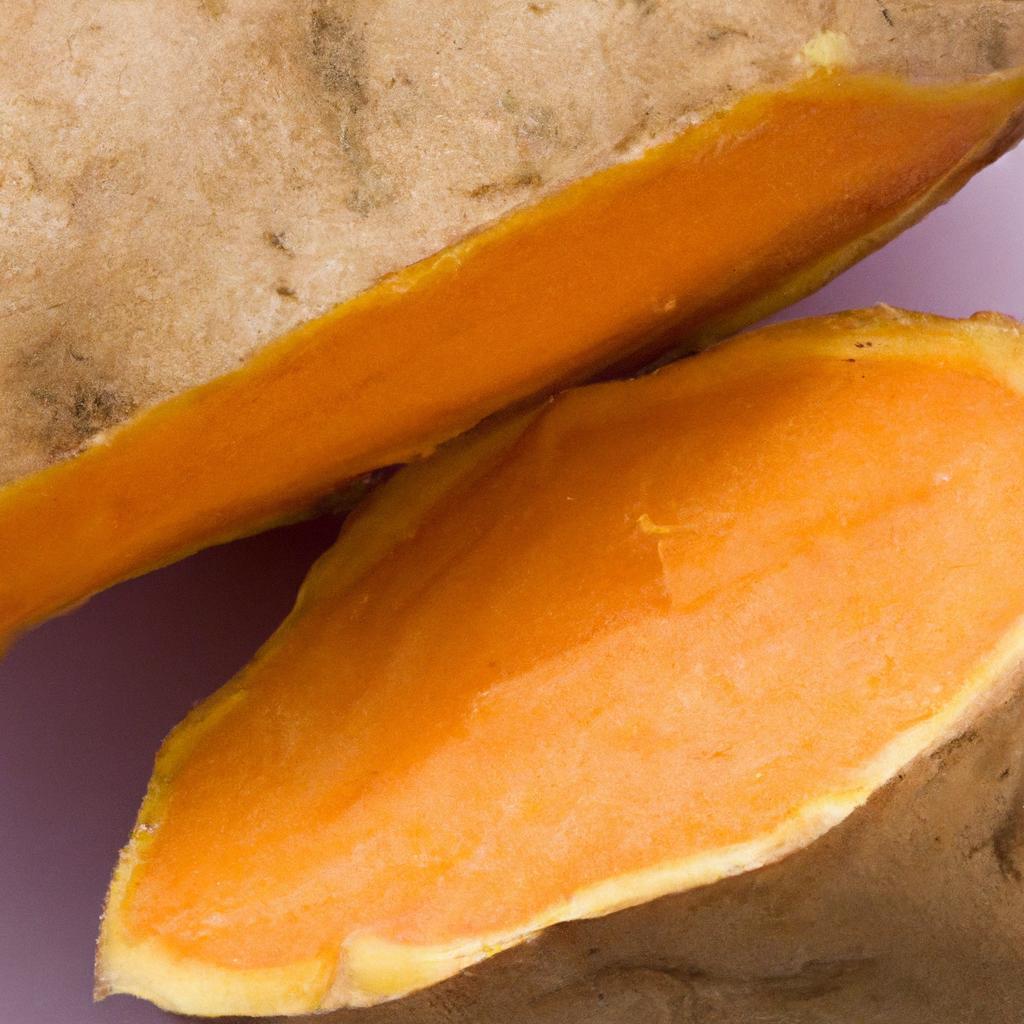Once upon a time in a bustling pet food factory, a curious dog named Max watched as his favorite kibble was crafted. He noticed sweet potato being mixed in, and his nose twitched with excitement. But wait—was sweet potato a grain? As the factory workers explained, sweet potato is actually a nutritious root vegetable, packed with vitamins and fiber, not a grain. This revelation reassured Max that his food was wholesome and beneficial. So, when choosing dog food, remember: sweet potato nourishes, but it’s not a grain! Choose wisely for your furry friend’s health.
Contents
- Understanding the Nutritional Profile of Sweet Potatoes in Dog Food
- Distinguishing Between Grains and Vegetables for Optimal Canine Health
- Evaluating the Benefits of Sweet Potatoes as a Grain Alternative
- Expert Recommendations for Incorporating Sweet Potatoes in Your Dogs Diet
- Q&A
Understanding the Nutritional Profile of Sweet Potatoes in Dog Food
Sweet potatoes are increasingly recognized as a valuable ingredient in dog food, offering a wealth of nutritional benefits that can enhance your pet’s diet. Unlike grains, sweet potatoes are classified as starchy vegetables, which means they provide a different set of nutrients that can be particularly beneficial for dogs. Their rich composition includes essential vitamins and minerals that support overall health and well-being.
One of the standout features of sweet potatoes is their high content of **beta-carotene**, a powerful antioxidant that converts to vitamin A in the body. This nutrient is crucial for maintaining healthy vision, skin, and immune function in dogs. Additionally, sweet potatoes are a great source of **fiber**, which aids in digestion and helps regulate blood sugar levels, making them an excellent choice for dogs with diabetes or those prone to obesity.
Moreover, sweet potatoes are packed with **vitamins C and B6**, as well as important minerals like potassium and manganese. These nutrients play vital roles in energy metabolism, muscle function, and maintaining a healthy nervous system. By incorporating sweet potatoes into your dog’s diet, you can ensure they receive a balanced intake of these essential nutrients without the potential drawbacks associated with grains.
Lastly, the palatability of sweet potatoes makes them an appealing addition to dog food formulations. Dogs are naturally drawn to their sweet flavor and soft texture, which can encourage picky eaters to enjoy their meals. By choosing dog food that includes sweet potatoes, you are not only providing your furry friend with a nutritious option but also enhancing their mealtime experience with a taste they love.
Distinguishing Between Grains and Vegetables for Optimal Canine Health
When it comes to understanding the nutritional components of dog food, it’s essential to differentiate between grains and vegetables. Grains, such as wheat, corn, and rice, are primarily carbohydrate sources that provide energy. They are often included in dog food for their digestible starches and fiber. However, some pet owners are concerned about the potential for grains to cause allergies or digestive issues in their dogs. This has led to a growing interest in alternative carbohydrate sources, such as vegetables.
Sweet potatoes, often touted for their health benefits, fall into the vegetable category rather than grains. They are rich in vitamins, particularly vitamin A, and provide a good source of dietary fiber. This makes sweet potatoes an excellent choice for dog food, as they can aid in digestion and promote overall gut health. Unlike grains, which can sometimes lead to inflammation or allergic reactions in sensitive dogs, sweet potatoes are generally well-tolerated and can be a nutritious addition to your dog’s diet.
Incorporating sweet potatoes into your dog’s meals can offer a variety of health benefits. They are low in fat and high in essential nutrients, making them a great option for dogs needing to maintain a healthy weight. Additionally, sweet potatoes have a low glycemic index, which means they release energy slowly, helping to keep your dog feeling full and satisfied for longer periods. This can be particularly beneficial for active dogs or those prone to obesity.
Ultimately, understanding the distinction between grains and vegetables is crucial for optimizing your dog’s health. By choosing dog food that includes sweet potatoes instead of grains, you can provide your furry friend with a wholesome, nutrient-dense diet. Always consult with your veterinarian to ensure that any dietary changes align with your dog’s specific health needs, but rest assured that sweet potatoes can be a fantastic addition to their nutrition plan.
Evaluating the Benefits of Sweet Potatoes as a Grain Alternative
Sweet potatoes have emerged as a popular ingredient in dog food, often touted for their numerous health benefits. Unlike traditional grains, sweet potatoes are rich in essential nutrients that can significantly enhance your dog’s diet. They are an excellent source of dietary fiber, which aids in digestion and promotes a healthy gut. This fiber content can help regulate blood sugar levels, making sweet potatoes a suitable option for dogs with diabetes or those prone to obesity.
In addition to fiber, sweet potatoes are packed with vitamins and minerals that contribute to overall canine health. They are particularly high in **vitamin A**, which supports vision, immune function, and skin health. Furthermore, sweet potatoes contain **vitamin C**, **manganese**, and **potassium**, all of which play vital roles in maintaining a dog’s energy levels and metabolic functions. By incorporating sweet potatoes into your dog’s diet, you can provide a nutrient-dense alternative to traditional grains.
Another significant advantage of sweet potatoes is their low allergenic potential. Many dogs suffer from food sensitivities or allergies, particularly to common grains like wheat and corn. Sweet potatoes serve as a hypoallergenic substitute, reducing the risk of adverse reactions while still delivering the necessary carbohydrates for energy. This makes them an ideal choice for dogs with sensitive stomachs or those on specialized diets.
Moreover, sweet potatoes offer a unique flavor and texture that many dogs find appealing. Their natural sweetness can entice even the pickiest eaters, making mealtime more enjoyable. By choosing dog food that includes sweet potatoes, you not only provide your pet with a wholesome grain alternative but also ensure they are excited about their meals. This combination of health benefits and palatability makes sweet potatoes a standout ingredient in the world of canine nutrition.
Expert Recommendations for Incorporating Sweet Potatoes in Your Dogs Diet
When considering the addition of sweet potatoes to your dog’s diet, it’s essential to ensure that they are prepared correctly to maximize their nutritional benefits. **Cooking sweet potatoes** is crucial, as raw sweet potatoes can be difficult for dogs to digest. Boiling, steaming, or baking them until soft not only enhances their flavor but also makes them easier for your furry friend to enjoy. Avoid adding any seasonings, butter, or oils, as these can be harmful to dogs.
Incorporating sweet potatoes into your dog’s meals can be done in various ways. You can mix **mashed sweet potatoes** into their regular food or serve them as a standalone treat. Additionally, consider using sweet potato slices as a healthy alternative to commercial dog treats. They can be dehydrated for a crunchy snack that your dog will love. This versatility makes sweet potatoes an excellent choice for enhancing your dog’s diet.
When introducing sweet potatoes, it’s important to start with small amounts to monitor your dog’s reaction. Some dogs may have sensitivities or allergies, so observing for any signs of digestive upset is key. Gradually increasing the portion can help your dog adjust to this new ingredient. **Consulting with your veterinarian** before making significant changes to your dog’s diet is always a wise decision, ensuring that sweet potatoes are a suitable addition for your pet’s specific health needs.
Lastly, sweet potatoes are not only delicious but also packed with nutrients that can benefit your dog’s overall health. They are rich in **fiber, vitamins A and C, and antioxidants**, which can support a healthy immune system and promote good digestion. By thoughtfully incorporating sweet potatoes into your dog’s diet, you can provide them with a tasty and nutritious option that contributes to their well-being. Remember, balance is key, so sweet potatoes should complement a well-rounded diet rather than replace essential nutrients from other food sources.
Q&A
-
What is sweet potato classified as?
Sweet potato is classified as a root vegetable, not a grain. It is rich in nutrients and provides a healthy source of carbohydrates for dogs.
-
Can sweet potato be beneficial for dogs?
Absolutely! Sweet potato is packed with vitamins, minerals, and dietary fiber, making it a nutritious addition to dog food that supports digestion and overall health.
-
Is sweet potato a suitable alternative for dogs with grain allergies?
Yes, sweet potato is an excellent alternative for dogs with grain allergies or sensitivities. It offers a digestible source of energy without the potential allergens found in grains.
-
How does sweet potato compare to grains in dog food?
Sweet potato provides a lower glycemic index compared to many grains, which can help maintain stable blood sugar levels in dogs. Additionally, it offers more vitamins and antioxidants, promoting better health.
sweet potato is not a grain but a nutritious vegetable that can enhance your dog’s diet. Choosing dog food with sweet potato can provide essential vitamins and fiber, promoting overall health. Make informed choices for your furry friend today!

大家好,我是彼得潘,專業的手法身體治療師。我喜歡探索和研究各種主題,並透過與人工智慧的合作分享專業、實用、有趣的文章。我們定期進行人工審核,以確保內容的準確性。如果您發現文章中有任何不準確的地方,請隨時與我們聯繫,我們會及時糾正。您可以透過 [email protected] 與我們聯繫。



